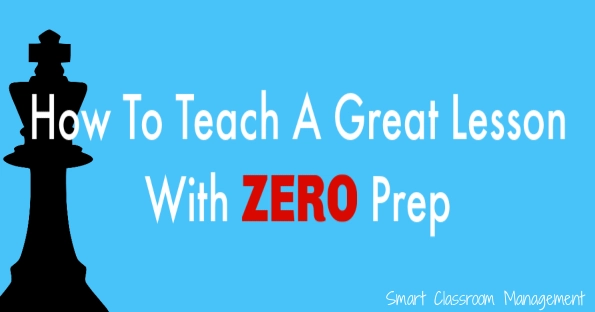
There is a way to teach a great lesson without preparation time.
But first, a caveat:
You must be an expert in your subject area. You can’t be an effective, compelling teacher if you don’t know your subject area well.
It’s our firm belief here at SCM that teacher ed. programs do an awful job preparing teachers for the reality of the classroom.
First and foremost is the lack of classroom management instruction and practice. A close second, is the disregard for content expertise.
While visiting classrooms, both are glaring weaknesses among many (many) teachers. The acceleration of student malaise and poor behavior since the pandemic has exposed this lack of training even more.
It’s the reason so many teachers are giving up. It’s why they’re complaining so vocally and assuming that there is nothing they can do about unmotivated and undisciplined students.
The reality is that they don’t have the skills. Forgive the digression, but it’s important to point out that having excellent classroom management and content mastery is a prerequisite for the strategy I’m going to share with you.
Given these, however, the way to teach lessons with little to no preparation is pretty awesome. In fact, with practice, you may find that the results are better than if you were to prepare for hours.
Here’s how it works:
Step #1 – Know what you want your students to know and/or be able to do.
There can never, ever be a question in your mind regarding your objective. It must be precise and clear in your head. No doubts or hesitations. “I want my students to be able to do X.”
Step #2 – Know how you want your students to prove they understand your objective.
You must have a way for them to demonstrate their knowledge of what you’ve taught them. It can be an essay, project, problem(s), presentation, diagram, map, etc., which they do independently.
Step #3 – Know how much time you have.
Managing the clock is an ability you must develop to be exacting and effective. Decide to the second how much time you have to teach and your students have to accomplish the task you give them.
Step #4 – Be 100% focused and dedicated to steps one through three.
You must be faithful to these three come hell or high water. Do not allow for any internal negotiation. No wavering or dovetails off this narrow focus. Know them and commit to them before the lesson.
Step #5 – With only your content knowledge, steps above, and your wits, teach the lesson.
Rely on pure improvisation to deliver the goods to your students. You’ll find that you’ll have greater wisdom and more compelling delivery than if you were to spend hours preparing.
Now, it’s important to point out that it’s not for everyone. It’s chess to checkers, and you get better and more confident the more you do it. But if you have the background knowledge and classroom management skills, you can do it for every lesson you teach.
Not only will you save yourself years of time and stress over the course of your career hunched over your desk, but you’ll be a great teacher. Your personality, creativity, and humor will shine—brighter than any lesson you’ve ever taught.
Your students will love learning from you, which will only make your classroom management that much stronger. They’ll make galloping progress, stacking successful understanding of objective after objective.
You’ll be able to up the ante on complexity and time spent working independently.
Best of all is that it’s a lot more fun to teach this way. If you think back to when you first decided to become a teacher, it’s what you pictured yourself doing.
Performing, mimicking, storytelling, dramatizing, regaling, emoting, captivating—all off the top of your head—while your students lean in, engrossed and lost in learning.
If you haven’t done so already, please join us. It’s free! Click here and begin receiving classroom management articles like this one in your email box every week.

More Stories
The Powerful Teacher Education Programs Shaping Tomorrow’s Most Inspiring Educators!
Education for all: Is the world on track? Some personal reflections on the first EFA Global Monitoring Report, 20 years back
There’s Only One Thing Better Than Proctoring